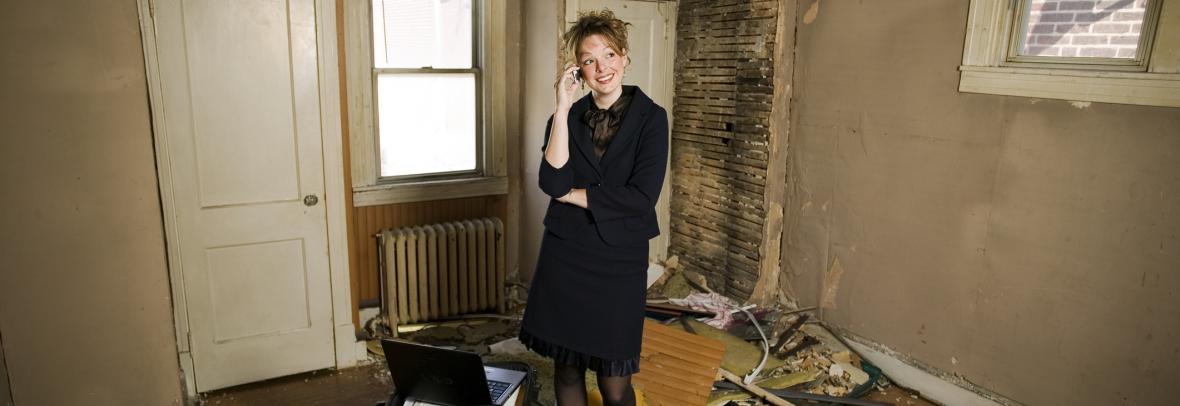HUD updated its 203(k) program to make it easier for homeowners to buyer fixer-uppers or refinance and repair their homes.
WASHINGTON – The federal government is updating a program that helps homebuyers purchase and renovate properties using a single mortgage in an effort to get more people to use a loan it considers key to preserving the country’s housing stock.
The U.S. Department of Housing and Urban Development is allowing homeowners more time and financing to make it easier for them to use federal 203(k) rehabilitation loans to buy fixer-uppers or refinance and repair their homes, department officials announced Tuesday at a news conference in Point Breeze.
The department also is increasing how much 203(k) consultants, who guide homeowners through the program, can be paid, which HUD hopes will grow their shrunken ranks.
The 203(k) program used to be a “powerful tool to help homebuyers achieve affordable homeownership by buying that fixer-upper. And that of course supports neighborhood stability and revitalization,” Julia Gordon, the assistant secretary for housing and a federal housing commissioner at HUD, said Tuesday. “But, unfortunately, the program didn’t keep up with changing market conditions. And it kind of fell into disuse.”
These loans make up a small fraction of mortgages, but the department hopes increasing usage of them can help chip away at the nationwide shortage of properties that homeowners can afford.
Pittsburg residents Kasam Simmons, 34, and his fiancée, Ikea Foster, 37, bought and are now renovating their first home using a 203(k) loan. When they started looking at homes to buy, they found that a lot of them were fixer-uppers. So they decided to purchase and renovate the rowhouse they already rented, which has been in Foster’s family for 100 years.
Work is almost complete on the renovations, which include modernizing the home; reconfiguring rooms; and installing new plumbing, electrical, heating, and cooling systems — “everything that the new construction homes have in this same neighborhood,” Simmons said.
“I never imagined that we would be able to have this home and have it change into the home that we wanted,” he said. He said that as a young Black man, he wanted to let people who look like him know that “all of us can do this.”
At Tuesday’s news conference, Philadelphia Mayor Cherelle L. Parker said that in 2003, she used a 203(k) loan that made it possible for her to purchase and renovate a home so she could stay in the neighborhood where she grew up. She said she was proud that HUD chose Philadelphia for the announcement of the “rebirth” of the program, which she said plays a role in her goal to build or repair 30,000 homes in four years.
New 203(k) rehab loan policies
Last year, HUD collected feedback from lenders and consumers as part of its efforts to update the 203(k) program.
Starting Tuesday, the version of the program meant for more minor remodeling and nonstructural repairs will allow homeowners to borrow more money. Maximum financing for total rehabilitation costs is increasing from $35,000 to $75,000. HUD plans to review this limit annually and adjust it as needed.
HUD also is giving homeowners more time to complete renovations and repairs. The 203(k) program’s success depends on the availability of quality contractors, and homeowners can have trouble finding companies that can complete the work within the program’s time frame.
Before Tuesday’s policy changes, HUD used to require homeowners to complete work within six months. Now, owners with more minor work to be done will have nine months to complete it. And owners whose homes need more substantial work will have 12 months.
Finding contractors is a task that 203(k) consultants can help with. These consultants advise homeowners throughout the renovation process, starting with a report that lays out the work that needs to be done and estimated costs.
The consultants, who report to loan officers, also can review contractors’ work and release funds periodically if the homeowner is satisfied. Homeowners are required to use these consultants when doing substantial renovations and can choose to use them for more minor work.
The trade group for these advisers, the National Association of FHA Consultants, had been lobbying for years for raises for 203(k) consultants to incentivize people to join and stay in the profession. HUD’s announcement Tuesday included increases in the fees consultants can charge homeowners. Allowable fees hadn’t been updated in decades.
Catherine Hall, executive director of the National Association of FHA Consultants, said in an interview that this change “is going to put more people in this industry, and it’s so needed.” Because 203(k) consultants are required for substantial renovations, a lack of enough qualified consultants has stymied the program.
Hall said she is concerned that HUD’s increase in the allowable loan amount for work considered more minor would put homeowners at risk, since they no longer need to work with 203(k) consultants for most projects up to $75,000. That “opens up a lot of opportunity for fraud and for poor workmanship and for the borrowers to be taken advantage of by unscrupulous contractors and individuals unaware of what it takes to do repairs,” she said. “It just increases the need for education.”
Hall said her association plans to continue teaching lenders, real estate professionals, and consumers about the value of consultants.
She also worries that allowing more time for repairs will mean contractors will drag their feet.
Despite Hall’s mixed feelings about some of HUD’s changes to the 203(k) program, she said, “it’s a wonderful program that helps people get loans to get homes that might otherwise never get owned” and repair homes and help disenfranchised people who might not otherwise be able to afford to buy a home.
By Michaelle Bond
Copyright © Distributed by Tribune Content Agency, LLC.

